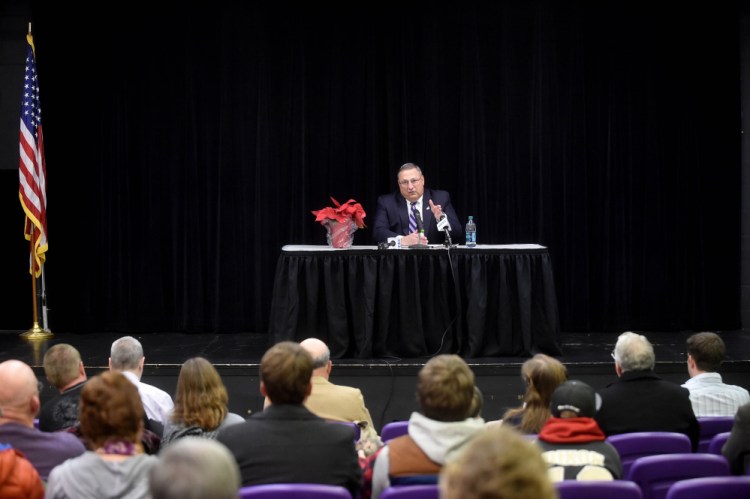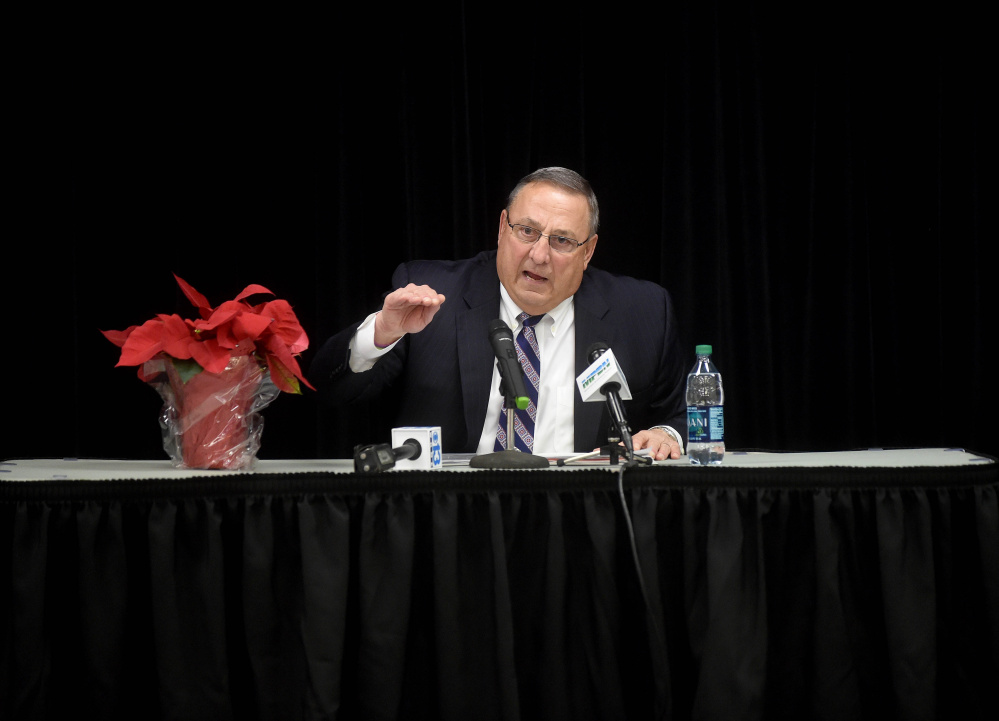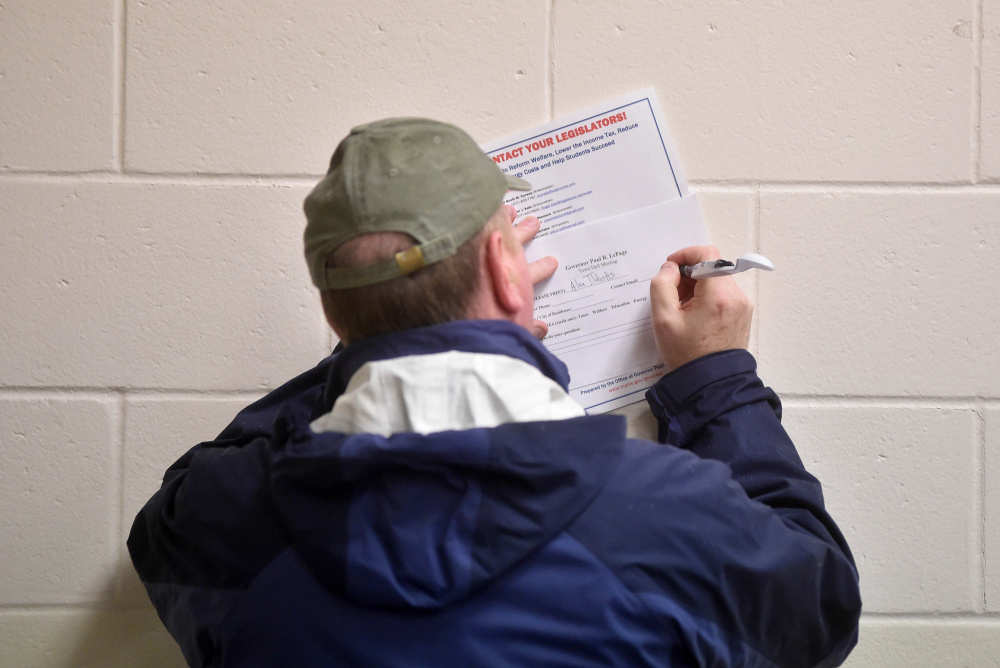WATERVILLE — Lorraine Rioux came to Gov. Paul LePage’s “town hall” meeting Thursday pleading for help.
The retired woman is hearing-impaired and said she has been struggling to get the MaineCare benefits she is entitled to and has had to go to the U.S. Social Security Administration office to defend herself.
“MaineCare was going to stop my benefits,” Rioux said. “I had to drive from Waterville to Farmington to defend the fact that I did write an application and an annual review.”
The state Department of Health and Human Services, she said, is not doing a “fine” job.
“They’re not fine in the right way towards the elders and towards the poor,” she said.
LePage, who was mayor of Waterville before becoming governor in 2011, assured Rioux he supports funding for people over 65 and those who are disabled. He wanted $46 million in the budget geared toward the elderly and disabled, but much of that was put toward other causes, including schools.
“I am with you 100 percent,” he said. “The people in Maine, when they turn 65, they’re kicked to the curb, just like our military.”
LePage’s press secretary, Adrienne Bennett, told Rioux she would make sure her information would be given to DHHS Commissioner Mary Mayhew, who was in the audience Thursday at Waterville Junior High School. Rioux spoke with Mayhew after the meeting, which drew about 70 people, including residents, educators, legislators and city officials.
LePage used Rioux’s example to emphasize one of the things the state needs to do — eliminate the income tax.
“That’s how we get more money for people in the state of Maine,” he said.
Increasing the mimimum wage, on the other hand, would hurt elderly people and those on fixed incomes, he said.
Responding to Rioux, he said he understands there is some relationship between MaineCare and Social Security, but Social Security is not something the state can control, because it is federal.
His goal for town hall meetings, he said, is to explain his vision for the state, what he is doing and why he is doing it.
Eliminating the state’s 7.1 percent income tax would put money into people’s pockets, and those people will invest in themselves, in homes, vehicles and other things, LePage said.
He also addressed welfare reform, saying most people receiving welfare are good people, but some things need cleaning up. For example, electronic benefit transfer, or EBT, cards are loaded by the federal government on the ninth day of each month; and between midnight and 3 a.m., 50 percent of the money on the cards in Maine is gone.
“If you need baby formula between midnight and 3 a.m., there are not many places to get it in Maine — that’s all I’m saying,” he said.
He said he has no problem with refugees but has a real issue with asylum seekers, 70 percent of whom are returned to their home countries.
“So for two years, we take care of them and they’re sent back,” he said, adding that they are in the U.S. illegally and Maine struggles with trying to help homeless veterans and veterans with post-traumatic stress disorder and those who cannot find jobs.
“I would think that we would take care of the people that we send over to keep us free,” he said. “We take care of them and we’re not doing a good job of it.”
The governor, who lived on Main Street before moving to Augusta, was facing a mostly friendly audience Thursday as he touted his plans for energy, improving education, working to keep young people in Maine and helping to reduce student debt.
Gary Mayhew said when LePage became governor, the unemployment rate was 8.3 percent and now it is 4.1 percent. He asked him if there is anything more he can do to improve the state’s economy.
LePage replied that the single biggest thing the state can do to lower the unemployment rate is to provide work skills for people 19 to 49 because they need to be able to get jobs. Adult education offices, community colleges, universities and other entities can help in that, he said.
“Work readiness is the most important thing to lower the unemployment rate,” he said.
Alan Tibbetts wanted to know what LePage intends to do to fill a Kennebec County commissioner vacancy. He said the governor was given a list of people for that spot, but LePage told him he had not seen a list and will look into it.
Gary Mosher said only three commissioners are sitting on the harness racing board and two more are needed. Appointments are made by the governor. LePage said he has been looking for people for those spots, but it has been tough. Mosher had received applause when he stood to address LePage, saying, “Thank you so much for having common sense. The last five years has been a pleasure, watching you turn the state around.”
After the meeting, Rep. Thomas R.W. Longstaff, a Democrat who represents Waterville, responded to LePage’s stance on lowering or eliminating the income tax.
“I think it’s worth having the discussion,” Longstaff said. “I don’t think it’s as easily or quickly resolved as he thinks. I do think we need to reduce the tax burden. There’s no question about that.”
Amy Calder — 861-9247
Twitter: @AmyCalder17
Send questions/comments to the editors.






Success. Please wait for the page to reload. If the page does not reload within 5 seconds, please refresh the page.
Enter your email and password to access comments.
Hi, to comment on stories you must . This profile is in addition to your subscription and website login.
Already have a commenting profile? .
Invalid username/password.
Please check your email to confirm and complete your registration.
Only subscribers are eligible to post comments. Please subscribe or login first for digital access. Here’s why.
Use the form below to reset your password. When you've submitted your account email, we will send an email with a reset code.